#bbc television shakespeare
Explore tagged Tumblr posts
Text
It’s an eye for an eye. Let that be the end of it. Just exile the Capulets. Apart from Juliet of course.
#bbc television shakespeare#prince escalus#lord capulet#lady capulet#lord montague#lady montague#romeo and juliet
3 notes
·
View notes
Text
ALAN HOWARD AS CORIOLANUS (1984)
@themousefromfantasyland @thealmightyemprex @the-blue-fairie












5 notes
·
View notes
Text
Murder, She Wrote guest stars on ‘Ship of Thieves’

Jane Withers- child actor known best for films in the 1930s and 40s. A few of those: Bright Eyes, Shooting High, Ginger, This is the Life, Paddy O’Day, Pepper, Angel’s Holiday, Rascals, We’re in the Army Now, Golden Hoofs. Later credits: Giant, The Alfred Hitchcock Hour, Summer Playhouse, The Love Boat, Hart to Hart, Hunchback of Notre Dame Disney animations. Second of two appearances.

Lee Meriwether mainly remembered for science fiction/fantasy cult shows and films in the 1960s- including Batman: The Movie (1966) and Batman tv show (1967), ST:TOS, The Time Tunnel, Land of the Giants. Other things you might recognise her from: Dragnet, Dr Kildare, The Man from U.N.C.L.E., Perry Mason. The Fugitive (1966) Mission Impossible (TV), Love American Style, Barnaby Jones, The Love Boat. This is her second of three appearances.
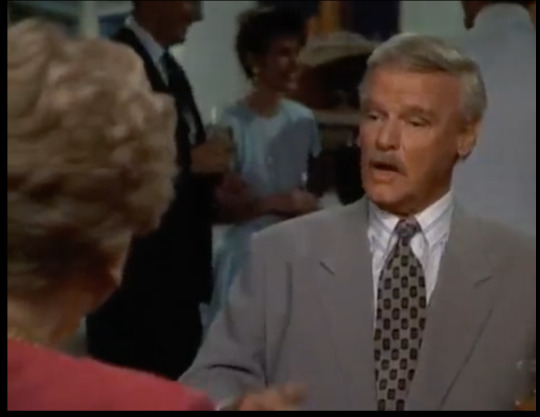
Keith Mitchell - an Australian actor primarily in UK/AUS projects. Known for The Hellfire Club, Withering Heights (1962), Seven Seas to Calais, BBC Play of the Month, The Six Wives of Henry VIII, Henry VIII and his Six Wives, BBC Television Shakespeare, and the Prince and the Pauper. This is his last of 9 appearances— unlike most MSW guest stars, he plays the same character throughout.
9.20 Episode aired May 2, 1993
#keith mitchell#lee meriwether#jane withers#murder she wrote#Bright Eyes#Shooting High#Ginger#This is the Life#Paddy O’Day#Pepper#Angel’s Holiday#Rascals#We’re in the Army Now#Golden Hoofs#The Hellfire Club#Withering Heights (1962)#Seven Seas to Calais#BBC Play of the Month#The Six Wives of Henry VIII#Henry VIII and his Six Wives#BBC Television Shakespeare#Batman: The Movie (1966) and Batman tv show (1967)#ST:TOS#The Time Tunnel#Land of the Giants#Dragnet#Dr Kildare#The Man from U.N.C.L.E.#Perry Mason. The Fugitive (1966) Mission Impossible (TV)#Love American Style
2 notes
·
View notes
Text
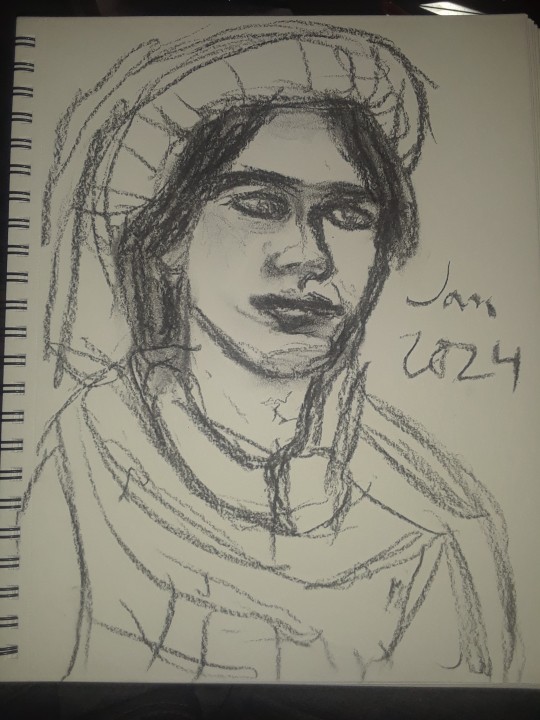
"The Duke of Somerset 2" - a(nother) drawing of the actor Brian Deacon in Henry VI, Part 2 (1983) directed by Jane Howell, done 1/29/2024 in about 10 or 15 minutes with one piece of willow charcoal and no erasing
#brian deacon#my drawing#2024#charcoal#i wanna say this is a gesture drawing but not quite. it is quite impressionistic. i do wanna do more practice drawings#(i say as if most of the stuff i post on here isn't half-assed scraps)#like. i don't do a lot of complete fully-shaded drawings but most of my time drawing lately has been immersed in one of those or another#including the one i've been working on for the past couple of weeks after i finished that self-portrait. it's got me quite anxious that one#every time i stop working on it (including today... i did this for an exercise after putting it down) i feel like im closer to finishing it#but a part of me thinks ill never be done with it#shakespeare#visual art#jane howell#henry vi part 2#bbc television shakespeare#brian deacon if you're reading this and i know you're not. hi you are sooo pretty#(as usual you can tell i'm far more interested in drawing faces than i am clothing. loool)#these sorts of practice help to break up the tension when i'm working on smth more effortful#it reminds me oh yeah i'm not a complete shitass can't do nothin artist#i just happen to be stuck on something HARD? never heard of it
3 notes
·
View notes
Text
Movie Review: Henry VI Part 1 (1983)
Title: Henry VI Part 1 Release Date: January 2, 1983 Director: Jane Howell Production Company: BBC Main Cast: John Benfield as Basset/French Sergeant/French Soldier/Scout Peter Benson as King Henry VI Brenda Blethyn as Joan La Pucelle Antony Brown as Duke of Burgundy David Burke as Duke of Gloucester Michael Byrne as Duke of Alençon Paul Chapman as Earl of Suffolk/Sir William Glasdale Ron Cook…

View On WordPress
#BBC Television Shakespeare#Drama#History#Hundred Years War#Movie Reviews#Movies#Television Reviews#Theater#Wars of the Roses#William Shakespeare
0 notes
Text
Hey I don't know who needs to hear this but PLEASE watch Inside No. 9 if you're a fan of horror, genre fiction, anthology series or just good filmmaking in general.
It's a British anthology show which radically alters the format between episodes, so each one feels more like a short film. Most episodes have some kind of plot twist and fit solidly in the mystery genre, but beyond that the show experiments a lot. It has episodes that go for horror, comedy, drama. One episode is entirely a sequel to a semi-obscure series made by the showrunners a few years earlier (Psychoville). There's an episode that is written entirely in iambic pentameter. A "live show" designed to recreate the experience of Ghostwatch with staged technical difficulties and sudden supernatural happenings.
It's honestly hard to overstate my love for the show. Some episodes can drag but it's rare to find two in a row that don't grab your attention. There are currently 8 seasons (though they're very short, the whole series totals are 49 episodes at time of writing)
If I can convince even ONE more person to watch this show I'll be happy, so please consider it. And if you have seen the show, what do you think?? What's your favorite episode??
#horror#horror movies#movies#tv#television#british tv#british telly#inside no 9#psychoville#iambic pentameter#shakespeare#yes there are MULTIPLE episodes that play on Shakespeare stuff- the Macbeth episode is one of my favs#reece shearsmith#steve pemberton#mark gatiss#bbc
175 notes
·
View notes
Text
sorry i just saw someone refer to the bbc as "the beeb." it's changed my life
#text post#no longer gonna waste my time w the mouthful of saying 'the bbc television shakespeare'#from now on i refer to that series as the beeb tv shakes#is this really common and i'm just american?
11 notes
·
View notes
Text
what was going on in early 2000s bbc fantasy television series. they really said okay here are the 90 square feet of forest we're going to film in here's our combined $25 budget for costumes from the thrift store here's the most batshit plot imaginable. Katie McGrath and Richard Armitage are here and they're going to give performances that would make shakespeare weep tears of joy. also we're going to throw in a cgi dragon voiced by john hurt
90 notes
·
View notes
Text
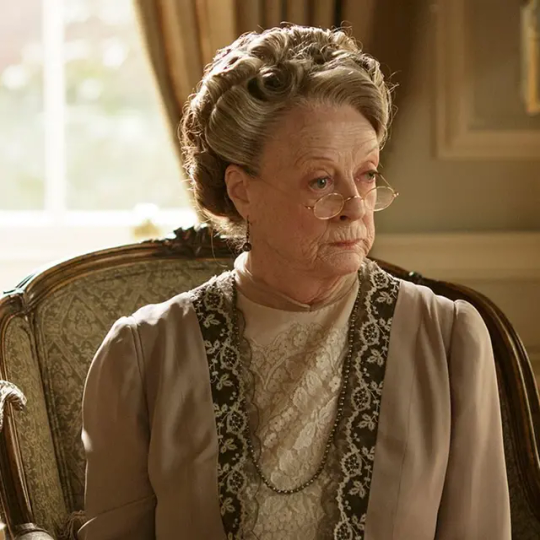
Dame Maggie Smith
A distinguished, double Oscar-winning actor whose roles ranged from Shakespeare to Harry Potter
Not many actors have made their names in revue, given definitive performances in Shakespeare and Ibsen, won two Oscars and countless theatre awards, and remained a certified box-office star for more than 60 years. But then few have been as exceptionally talented as Maggie Smith, who has died aged 89.
She was a performer whose range encompassed the high style of Restoration comedy and the sadder, suburban creations of Alan Bennett. Whatever she played, she did so with an amusing, often corrosive, edge of humour. Her comedy was fuelled by anxiety, and her instinct for the correct gesture was infallible.
The first of her Oscars came for an iconic performance in The Prime of Miss Jean Brodie (1969). Miss Brodie’s pupils are the “crème de la crème”, and her dictatorial aphorisms – “Give me a girl at an impressionable age, and she is mine for life” – disguise her intent of inculcating enthusiasm in her charges for the men she most admires, Mussolini and Franco.
But Smith’s pre-eminence became truly global with two projects towards the end of her career. She was Professor Minerva McGonagall in the eight films of the Harry Potter franchise (she referred to the role as Miss Brodie in a wizard’s hat) between 2001 and 2011. Between 2010 and 2015, in the six series of Downton Abbey on ITV television (sold to 250 territories around the world), she played the formidable and acid-tongued Dowager Countess of Grantham, Lady Violet, a woman whose heart of seeming stone was mitigated by a moral humanity and an old-fashioned, if sometimes overzealous, sense of social propriety.
Early on, one critic described Smith as having witty elbows. Another, the US director and writer Harold Clurman, said that she “thinks funny”. When Robin Phillips directed her as Rosalind in As You Like It in 1977 in Stratford, Ontario, he said that “she can respond to something that perhaps only squirrels would sense in the air. And I think that comedy, travelling around in the atmosphere, finds her.” Like Edith Evans, her great predecessor as a stylist, Smith came late to Rosalind. Bernard Levin was convinced that it was a definitive performance, and was deeply affected by the last speech: “She spoke the epilogue like a chime of golden bells. But what she looked like as she did so, I cannot tell you; for I saw it through eyes curtained with tears of joy.”
She was more taut and tuned than any other actor of her day, and this reliance on her instinct to create a performance made her reluctant to talk about acting, although she had a forensic attitude to preparation. With no time for the celebrity game, she rarely went on television chat shows – her appearance on Graham Norton’s BBC TV show in 2015 was her first such in 42 years – or gave newspaper interviews.
Her life she summed up thus: “One went to school, one wanted to act, one started to act and one’s still acting.” That was it. She first went “public”, according to her father, when, attired in pumps and tutu after a ballet lesson, she regaled a small crowd on an Oxford pavement with one of Arthur Askey’s ditties: “I’m a little fairy flower, growing wilder by the hour.”
Unlike her great friend and contemporary Judi Dench, Smith was a transatlantic star early in her career, making her Broadway debut in 1956 and joining Laurence Olivier’s National Theatre as one of the 12 original contract artists in 1963.
In 1969, after repeatedly stealing other people’s movies, with Miss Brodie she became a star in her own right. She was claiming her just place in the elite, for she had already worked with Olivier, Orson Welles and Noël Coward in the theatre, not to mention her great friend and fellow miserabilist Kenneth Williams, in West End revue. She had also created an international stir in two movies, Anthony Asquith’s The VIPs (1963) – she didn’t just steal her big scene with him, Richard Burton complained, “she committed grand larceny” – and Jack Clayton’s The Pumpkin Eater (1964), scripted by Harold Pinter from the novel by Penelope Mortimer.
Before Harry Potter, audiences associated Smith most readily with her lovelorn, heartbreaking parishioner Susan in Bed Among the Lentils, one of six television monologues in Bennett’s Talking Heads (1988). Susan was a character seething with sexual anger; the first line nearly said it all – “Geoffrey’s bad enough, but I’m glad I wasn’t married to Jesus.”
And the funniest moment in Robert Altman’s upstairs/downstairs movie Gosford Park (2001) – in some ways a template for Downton Abbey, and also written by Julian Fellowes — was a mere aside from a doleful Smith as Constance Trentham turning to a neighbour on the sofa, as Jeremy Northam as Ivor Novello took a bow for the song he had just sung. “Don’t encourage him,” she warned, archly, “he’s got a very large repertoire.” Such a moment took us right back to the National in 1964 when, as the vamp Myra Arundel in Coward’s Hay Fever, she created an unprecedented (and un-equalled) gale of laughter on the single ejaculation at the breakfast table: “This haddock is disgusting.”
Born in Ilford, Essex, she was the daughter of Margaret (nee Hutton) and Nathaniel Smith, and educated at Oxford high school for girls (the family moved to Oxford at the start of the second world war because of her father’s work as a laboratory technician). Maggie decided to be an actor, joined the Oxford Playhouse school under the tutelage of Frank Shelley in 1951 and took roles in professional and student productions.
She acted as Margaret Smith until 1956, when Equity, the actors’ union, informed her that the name was double-booked. She played Viola with the Oxford University dramatic society in 1952 – John Wood was her undergraduate Malvolio – and appeared in revues directed by Ned Sherrin. “At that time in Oxford,” said Sherrin, “if you wanted a show to be a success, you had to try and get Margaret Smith in it.”
The Sunday Times critic of the day, Harold Hobson, spotted her in a play by Michael Meyer and she was soon working with the directors Peter Hall and Peter Wood. “I didn’t think she would develop the range that she subsequently has,” said Hall, “but I did think she had star quality.”
One of her many admirers at Oxford, the writer Beverley Cross, initiated a long-term campaign to marry Smith that was only fulfilled after the end of her tempestuous 10-year relationship with the actor Robert Stephens, with whom she fell in love at the National and whom she married in 1967. This was a golden decade, as Smith played a beautiful Desdemona to Olivier’s Othello; a clever and impetuous Hilde Wangel to first Michael Redgrave, then Olivier, in Ibsen’s The Master Builder; and an irrepressibly witty and playful Beatrice opposite Stephens as Benedick in Franco Zeffirelli’s Sicilian Much Ado About Nothing, spangled in coloured lights.
Her National “service” was book-ended by two particularly wonderful performances in Restoration comedies by George Farquhar, The Recruiting Officer (1963) and The Beaux’ Stratagem (1970), both directed by William Gaskill, whom she called “simply the best teacher”. In the first, in the travesty role of Sylvia, her bubbling, playful sexuality shone through a disguise of black cork moustache and thigh-high boots on a clear stage that acquired, said Bamber Gascoigne, an air of sharpened reality, “like life on a winter’s day with frost and sun”.
In the second, her Mrs Sullen, driven frantic by boredom and shrewish by a sodden, elderly husband, was a tight-laced beanpole, graceful, swaying and tender, drawing from Ronald Bryden a splendidly phrased comparison with some Henri Rousseau-style giraffe, peering nervously down her nose with huge, liquid eyes at the smaller creatures around, nibbling off her lines fastidiously in a surprisingly tiny nasal drawl.
With Stephens, she had two sons, Chris and Toby, who both became actors. When the marriage hit the rocks in 1975, after the couple had torn strips off each other to mixed reviews in John Gielgud’s 1973 revival of Coward’s Private Lives, Smith absconded to Canada with Cross – whom she quickly married – and relaunched her career there, far from the London hurly-burly, but with access to Hollywood.
She played not just Rosalind in Stratford, Ontario, but also Lady Macbeth and Cleopatra to critical acclaim, as well as Judith Bliss in Coward’s Hay Fever and Millamant in William Congreve’s The Way of the World (this latter role she repeated triumphantly in Chichester and London in 1984, again directed by Gaskill). But her films at this time especially reinforced her status as a comedian of flair and authority, none more than Neil Simon’s California Suite (1978), in which Smith was happily partnered by Michael Caine, and won her second Oscar in the role of Diana Barrie, an actor on her way to the Oscars (where she loses).
Smith’s comic genius was increasingly refracted through tales of sadness, retreat and isolation, notably in what is very possibly her greatest screen performance, in Clayton’s The Lonely Passion of Judith Hearne (1987), based on Brian Moore’s first novel, which charts the disintegration of an alcoholic Catholic spinster at guilty odds with her own sensuality.
This tragic dimension to her comedy, was seen on stage, too, in Edna O’Brien’s Virginia (1980), a haunting portrait of Virginia Woolf; and in Bennett’s The Lady in the Van (1999), in which she was the eccentric tramp Miss Shepherd. Miss Shepherd was a former nun who had driven ambulances during blackouts in the second world war and ended up as a tolerated squatter in the playwright’s front garden. Smith brought something both demonic and celestial to this critical, ungrateful, dun-caked crone and it was impossible to imagine any other actor in the role, which she reprised, developed and explored further in Nicholas Hytner’s delightful 2015 movie based on the play.
She scored two big successes in Edward Albee’s work on the London stage in the 1990s, first in Three Tall Women (1994, the playwright’s return to form), and then in one of his best plays, A Delicate Balance (1997), in which she played alongside Eileen Atkins who, like Dench, could give Smith as good as she got.
The Dench partnership lay fallow after their early years at the Old Vic together, but these two great stars made up for lost time. They appeared together not only on stage, in David Hare’s The Breath of Life (2002), playing the wife and mistress of the same dead man, but also on film, in the Merchant-Ivory A Room With a View (1985), Zeffirelli’s Tea With Mussolini (1999) and as a pair of grey-haired sisters in Charles Dance’s debut film as a director, Ladies in Lavender (2004). Smith referred to this latter film as “The Lavender Bags”. She had a name for everyone. Vanessa Redgrave she dubbed “the Red Snapper”, while Michael Palin, with whom she made two films, was simply “the Saint”.
With Palin, she appeared in Bennett’s A Private Function (1984), directed by Malcolm Mowbray – “Moaner Mowbray” he became – in which an unlicensed pig is slaughtered in a Yorkshire village for the royal wedding celebrations of 1947. Smith was Joyce Chilvers, married to Palin, who carries on snobbishly like a Lady Macbeth of Ilkley, deciding to throw caution to the winds and have a sweet sherry, or informing her husband matter-of-factly that sexual intercourse is in order.
She had also acted with Palin in The Missionary (1982), directed by Richard Loncraine, who was responsible for the film of Ian McKellen’s Richard III (1995, in which she played a memorably rebarbative Duchess of York) and My House in Umbria (2003), a much-underrated film, adapted by Hugh Whitemore from a William Trevor novella. This last brought out the very best in her special line in glamorous whimsy and iron-clad star status under pressure. She played Emily Delahunty, a romantic novelist opening her glorious house in Umbria to her three fellow survivors in a bomb blast on a train to Milan. One of these was played by Ronnie Barker, who had been at architectural college with Smith’s two brothers and had left them to join her at the Oxford Playhouse. Delahunty finds her new metier as an adoptive parent to a little orphaned American girl.
She was Mother Superior in the very popular Sister Act (1992) and its sequel, and her recent films included a “funny turn” as a disruptive housekeeper in Keeping Mum (2005), a vintage portrait of old age revisited by the past in Stephen Poliakoff’s Capturing Mary (on television in 2007) and as a solicitous grandmother of a boy uncovering a ghost story in Fellowes’s From Time to Time (2009).
As this latter film was released she confirmed that she had been diagnosed with breast cancer and had undergone an intensive course of chemotherapy, but had been given the all-clear – only to be struck down by a painful attack of shingles, a typical Maggie Smith example of good news never coming unadulterated with a bit of bad.
Her stage appearance as the title character in Albee’s The Lady from Dubuque at the Theatre Royal, Haymarket, in 2007 was, ironically, about death from cancer. She returned to the stage for the last time in 2019, as Brunhilde Pomsel in Christopher Hampton’s one-woman play A German Life, at the Bridge theatre, London.
Cross, who was a real rock, and helped protect her from the outside world, died in 1998. But Smith picked herself up, and went on to perform as sensationally and beguilingly as she had done all her life, including memorable appearances in the Best Exotic Marigold Hotel films (2011 and 2015) and two Downton Abbey movie spin-offs (2019 and 2022). Her final film role was in The Miracle Club (2023), co-starring Kathy Bates and Laura Linney.
She had been made CBE in 1970 and a dame in 1990, and in 2014 she was made a Companion of Honour. Her pleasure would have been laced with mild incredulity. A world without Smith recoiling from it in mock horror, and real distaste, will never seem the same again.
She is survived by Chris and Toby, and by five grandchildren.
🔔 Maggie Smith (Margaret Natalie Smith), actor, born 28 December 1934; died 27 September 2024
Daily inspiration. Discover more photos at Just for Books…?
47 notes
·
View notes
Text
David as Benedick in Much Ado About Nothing (the first time he did it, that is!)
David Tennant fans are aware of 2011's brilliant Much Ado About Nothing, in which DT starred as Benedick, alongside Catherine Tate as Beatrice. Filmed at the Wyndham's Theatre in London and directed by Josie Rourke, the production was recorded and offered on Digital Theatre.
But did you know David had played Benedick before?
Yep - he sure has!
It was in 2001, a full decade before his production with Catherine.
Beginning in 1999, BBC Radio 3 launched Shakespeare For The Millennium, an ambitious project to dramatize seventeen Shakespeare productions in four years.
The project was done in collaboration with BBC Worldwide, which emphasized it wanted to take a contemporary, innovative approach to the Bard. It launched on 12 September 1999 with a Shakespeare discussion panel, and a new production of Hamlet -- starring none other than Michael Sheen as the Dane!
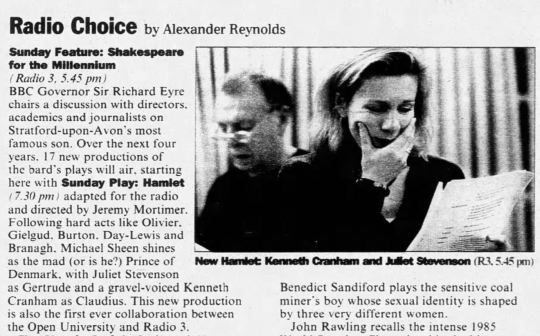
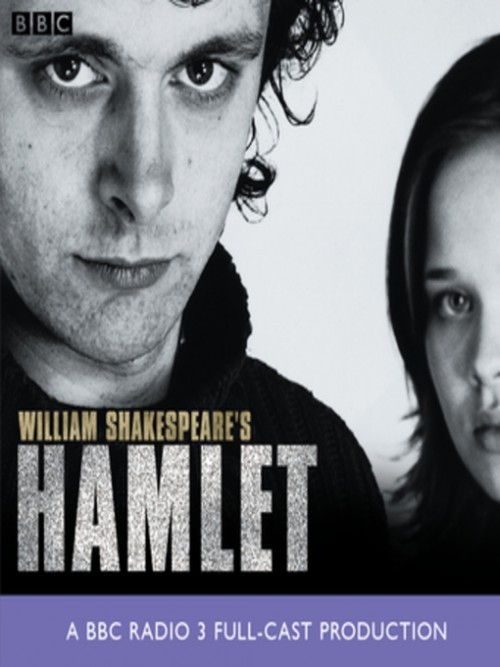
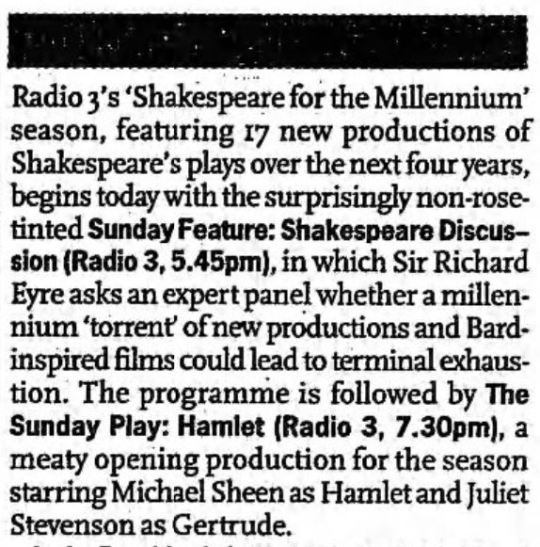
On 23 September 2001, BBC Radio 3 broadcast a new production of Much Ado About Nothing as the Sunday Play, with David in the lead role as Benedick and Samantha Spiro as Beatrice. Adapted by Sally Avens, it featured an introduction (as had all the previous productions in the Shakespeare For The Millennium series) by Richard Eyre, the former Director of the Royal National Theatre.
The production also starred a few other recognizable names. There was Chiwetel Ejiofor as Claudio, Emilia Fox as Hero, David Swift as Leonato, Julian Rhind-Tutt as Don John, and David Haig as Dogberry.
All original music was composed and performed by Simon Oakes and Adam Wolters.
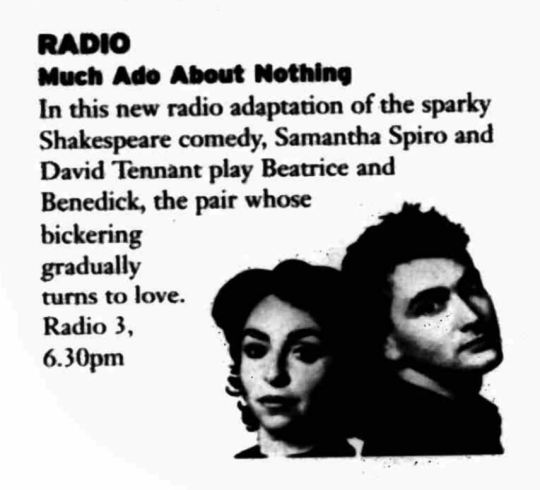
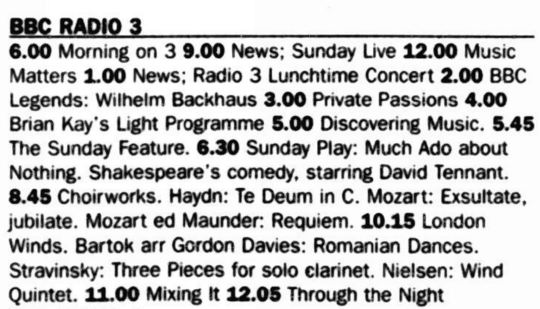
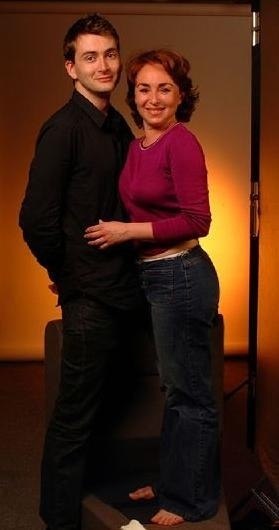
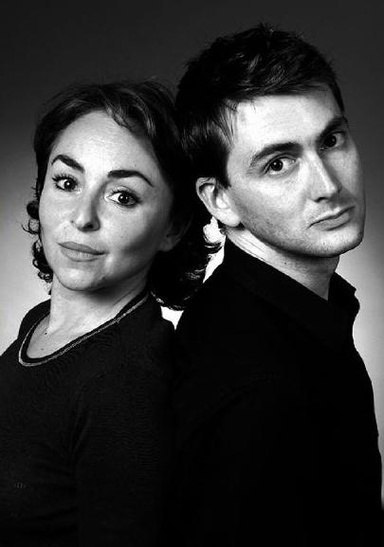
Radio listings and announcements, and promo photos of David and Samantha Spiro
Here's a review of the prodcuction!
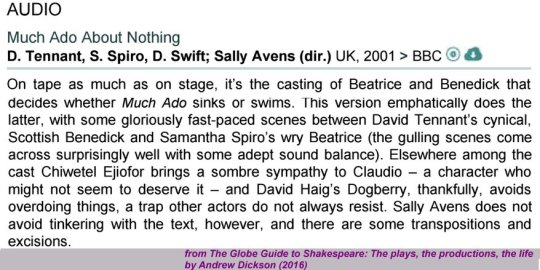
Much Ado About Nothing was commercially released by BBC Worldwide as part of the BBC Radio collection series in 2001.
The sleeve notes of cassettes and CDs of the production include a scene-by-scene synopsis, a full character analysis, and an essay on interpretation from the director Sally Avens.
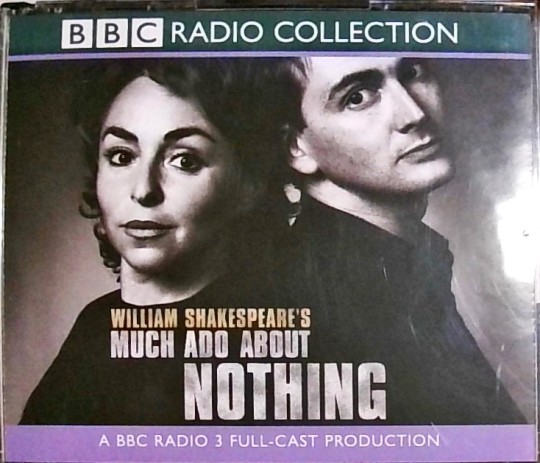
Almost four years later, in November 2005, BBC One broadcast a television series called ShakespeaRe-Told, a set of four adaptations of Shakespeare's plays. Each play was adapted by a different writer, and all were relocated to the present day.
The first to be broadcast - on 7 November 2005 - was a modern-day version of Much Ado About Nothing starring Sarah Parrish and Damien Lewis...and Billie Piper and Nina Sosanya and Olivia Colman!
You can watch it here:
youtube
Six days after this television broadcast - on 13 November 2005 at 7:15 pm - BBC Radio 3 re-broadcast the audio version starring David and Samantha in its 'Drama On 3' slot.
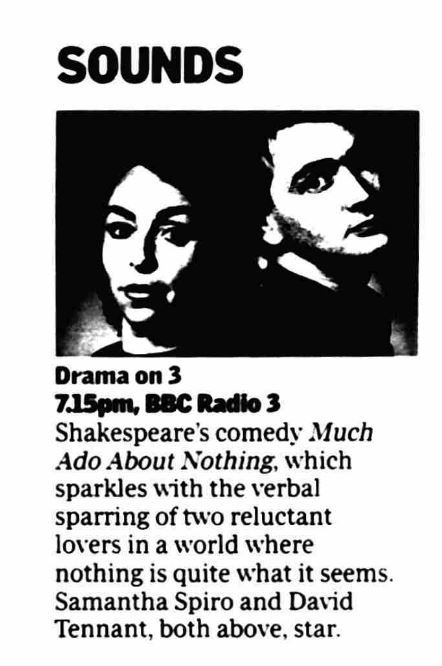
Fast forward to August 2020.
The BBC released a set of four BBC Radio Shakespeare collections: Histories, Comedies, Tragedies, and Roman Plays. Much Ado About Nothing was included in the collection of Comedies, and became available as an Audible digital download.
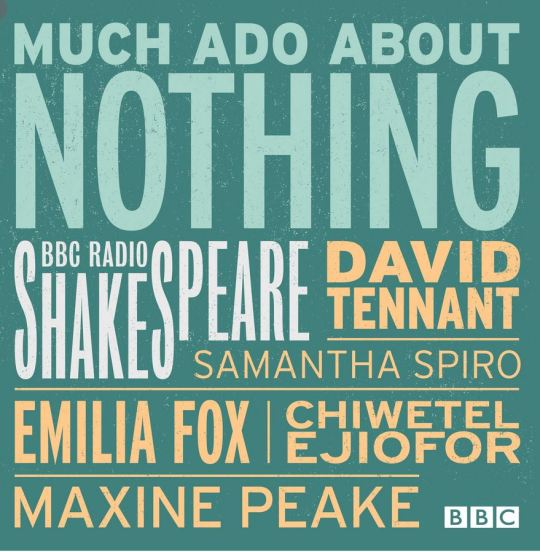
If you want to listen, you can find this collection a lot of places. It might be at your local library or on Overdrive, on Google Play, or as an Amazon Audible book.
Or, ya know, just go here:
93 notes
·
View notes
Text
THE HOLMWOOD FOUNDATION PILOT EPISODE CAST/CREW - PART ONE

REBECCA ROOT - MADDIE TOWNSEND/MINA HARKER
Rebecca trained at Mountview Academy of Theatre Arts. Theatre credits include A Midsummer Night’s Dream at Shakespeare’s Globe, The Curious Incident of the Dog in the Night-Time for the National Theatre (UK and Ireland tour); Rathmines Road for Fishamble at the Abbey Theatre, Dublin; Trans Scripts at the Edinburgh Festival Fringe and American Repertory Theater in Cambridge, Massachusetts; The Bear / The Proposal at the Young Vic; and Hamlet at the Gielgud Theatre and Athens International Festival. TV, Film and Video Game credits include Monsieur Spade, This Is Christmas, Irvine Welsh’s Crime, Hogwarts Legacy, Horizon Forbidden West, Heartstopper, Annika, The Rising, Sex Education, The Gallery, The Queen’s Gambit, Finding Alice, Creation Stories, Last Christmas, The Sisters Brothers, Colette, The Danish Girl, Flack, The Romanoffs, Moominvalley, Hank Zipzer, Boy Meets Girl, Doctors, Casualty, The Detectives, and Keeping Up Appearances. Radio credits include Clare In The Community, Life Lines, The Hotel, and 1977 for BBC Radio 4. Guest appearances include Woman’s Hour, Front Row, Loose Ends, Saturday Live, and A Good Read. She plays Tania Bell in the award-winning Doctor Who: Stranded audio dramas. Rebecca has also recorded numerous documentary narrations, audiobooks, and voice-overs. Rebecca is also a voice and speech coach, holding the MA in Voice Studies from Royal Central School of Speech and Drama.

SEAN CARLSEN - JEREMY LARKIN/ JONATHAN HARKER
Born in South Wales, Seán trained at the Royal Welsh College of Music & Drama. He has worked extensively in audio drama, television, theatre and film. Seán is perhaps best known to Doctor Who fans as Narvin in the Doctor Who audio series Gallifrey and has appeared on TV in Doctor Who - The Christmas Invasion and Torchwood. Recent TV credits include Mudtown (BBCiplayer/S4C), Dal y Mellt (Netflix), His Dark Materials (BBC1), All Creatures Great and Small (Channel 5), A Mother's Love (Channel 4) and Series 5 of Stella (Sky1). Films include supporting leads in Boudica - Rise of the Warrior Queen, cult horror The Cleansing, the lead in Forgotten Journeys and John Sheedy’s forthcoming film ‘Never Never Never’

SAM CLEMENS - ARTHUR JONES
Samuel Clemens trained at the Drama Centre London and is an award-winning director with over twenty years’ experience. Samuel has recently written and directed his debut feature film ‘The Waterhouse’ with Take The Shot Films & Featuristic Films and represented by Raven Banner Entertainment, which is due for release this coming year. In addition, he has directed fourteen short films, winning awards all over the world including shorts ‘Surgery (multi-award winning), A Bad Day To Propose (Straight 8 winner 2021), Say No & Dress Rehearsal’. Samuel also directs critically acclaimed number one UK stage tours and fringe shows (Rose Theatre Kingston, Swansea Grand, Eastbourne, Yvonne Arnaud, Waterloo East Theatre) and commercials include clients JD Sports, Shell and Space NK. Samuel is also a regular producer and director for Big Finish Productions & Anderson Entertainment. He has cast, directed, produced and post supervised numerous productions of ‘Doctor Who – (BBC), The Avengers (Studio Canal), Thunderbirds, Stingray (Anderson Entertainment), Callan, Missy, Gallifrey’& Shilling & Sixpence Investigate’ and many more. Samuel has directed world class talent such as, Sir Roger Moore, Ben Miles, Tom Baker, Sylvester McCoy, Alex Kingston, Frank Skinner, Rita Ora, Rosie Huntingdon-Whiteley, Rufus Hound, David Warner, Celia Imrie, Samuel West, Youssef Kerkour, Sophie Aldred, Ian McNiece, Colin Baker, Olivia Poulet, Stephen Wight, Jade Anouka, Mimi Ndwendi, Michelle Gomez, Peter Davidson, Paul O’Grady and many more. Samuel is one of the founding members and directors at Take The Shot Films Ltd and is Head of Artistic Creation and Direction. Lastly, Samuel is a regular tutor at The London Film Academy, The Giles Foreman Centre for Acting & The Rose Youth Theatre and is a member of The Directors Guild UK. As for upcoming projects, Sam is currently in pre-production on his next feature film “On The Edge of Darkness”, which is based on his dad’s stage play “Strictly Murder”.

ATTILA PUSKAS - DRACULA
Attila Puskás is a native Hungarian Voice Actor born in Transylvania – Romania, so Romanian is in his bag of tricks too, but most of his work is done in English, in a Transatlantic Eastern European Accent, but is quite capable of Hungarian, Romanian and International Eastern European accents, plus Standard American. His voice range is Adult to Middle Aged (30-40+) due to his deep voice. Vocal styles can range from authoritive, brooding to calming and reassuring and much more. He’s most experienced in character work, like Animations and Games, but his skills encompass Commercials to Narration as well. He’s received training through classes and workshops, pushing him to the next level to achieve higher standards. Now on a journey to perfect these skills and put them to good use!
PART TWO: HERE
PART THREE: HERE
#A lengthier look at our cast and crew!#The Holmwood Foundation#the holmwood foundation podcast#jeremy larkin#maddie townsend#Rebecca Root#Sean Carlsen#arthur f jones#production updates#Dracula#Sam Clemens#Attila Puskas#cast announcement#podcast#horror fiction podcast#fiction podcast#Q
50 notes
·
View notes
Text
So….exile for ten years?
2 notes
·
View notes
Text
@thealmightyemprex
1 note
·
View note
Text
Adam Nagaitis as Hamlet!
RADA rehearsal, 2012
(now in HD)

Did you know that Adam played Hamlet when he was in RADA, and even was awarded for it? (BBC Carleton Hobbs Bursary Award 2012 for Best Solo in Shakespeare/or Classic Theatre)
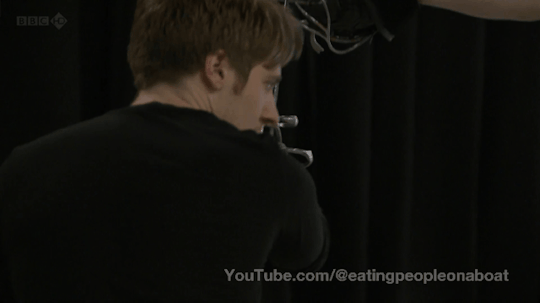
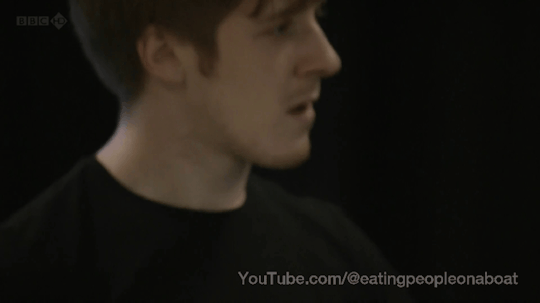
I wanted to get this one in HD for so long, and im so happy i managed to! Fencing Adam is not something you see every day.

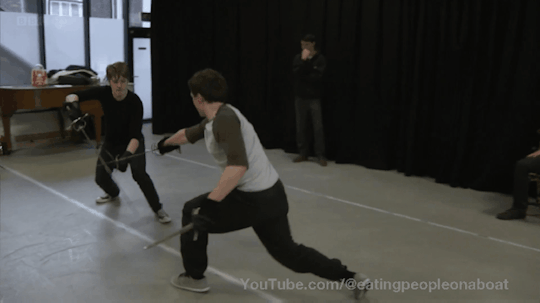


I had to smash and split and tear this video apart (it was the only way possible, unfortunately), so there are two parts:
1) ⬇️
2) ⬇️
Bonus:
Boxing Adam sooo hot! (im pretty sure you saw that one too, but we're archiving here)


#adam nagaitis#the terror#cornelius hickey#the terror amc#shakespeare#william shakespeare#hamlet#boxing#british actors#the terror cast
148 notes
·
View notes
Text
There’s a lot on my head— namely, a head, like Marie Antoinette used to have— and King Charles (the First)— (the new one—whatever)— (I think he still has one, but it’s not in great shape).
But what of the mind? Never mind— but the body, it burns. And I lie in my bed looking at Joan of Arc in a BBC feature— condemned with a baby (or, bastard)— oh, Joan, or Jeanne, la Pucelle— a poor little maid that a poor little Bard suited up—in fine armor to slutshame. Oh well.
Oh well, well well well I’m not feeling these days but for movies and books that I gaze on. Praise God for recurring malaise and disease— I’ve been struck with for fifteen years now... quite a chunk of my life
when I’m just 24, and my grandmother’s baby— (my grandmother’s dead)— (but she wasn’t, before).
No, all four of my grandparents saw me grow up—as this wretch— little nine-year-old girl full of needles, I am— I continue to be in my hospital bed glued to the TV.
What integrity I must inspire in my elders— their wise niece and daughter a weakling, for now— (no, not now, but forever)— I take the remote and flip to cartoons.
I wrote poetry once— (I still do—in my head) (that thing I still have... despite) and I wrote it for years and I’m writing it now in force— in rebellion against the skin and the bones and the muscles, not moving without consequence—
but the mind— and the body!— being idle... I hate it. Even more than the pain, or the punishment I submit to— to claim Me my own over this, my fatigue— my war from some film like a period piece—
so. I fight for some king? Or for God? Heaven knows— but I’m stylishly dressed, eloquent, my last words and woes of my tragedy— (how nice that’d be)— find heroic catharsis for the audience to see...
but for Me? What of Me? Oh, that’s Sunday. Or not. Wait, it’s Friday?—They all look the same in my house. My garden’s no calendar, my dog’s not my boss, but my job is to live... but loss... all of this— losing years once again of my bright little life.
Nana’s sore little girl, I submit, put my pen down again.
“Chorus—pretend Me I’m buried.” - a free verse poem written 7/07/2023
#ive been through a lot lately#and forever#free verse#poetry#poem#poets on tumblr#free meter#spilled ink#chronic illness#shakespeare#joan of arc#henry vi part 1#(yes this is in reference to the 1983 bbc television film directed by the iconic jane howell)#(sick girl entertainment)#modern poetry#original writing
19 notes
·
View notes
Text
Christopher Benjamin 1934-2025

The actor Christopher Benjamin has died at the age of 90.
Christopher Benjamin is best known to Doctor Who fans for his virtuoso performance in the 1977 Fourth Doctor story The Talons of Weng-Chiang. He played Henry Gordon Jago the owner of the Palace Theatre who teams up with Professor George Litefoot, as played by Trevor Baxter, to help the Doctor defeat Magnus Greel and his acolyte Li H'sen Chang.
The chemistry between Benjamin and Baxter ensured that the couple were given their own spin-off audio series by Big Finish, with fourteen series of Jago & Litefoot being released between 2010 and 2017.
Benjamin's first appearance in Doctor Who was in the 1970 story Inferno, where he played Sir Keith Gold the director of the Inferno Project.
He was one of the few actors who appeared in both the original series and the revived 2005 series appearing with the Tenth Doctor in the 2008 story The Unicorn and the Wasp where he played Colonel Hugh Curbishley.
Born in Trowbridge in Wiltshire, Benjamin was a familiar face on British Television for over forty years. His passion for acting was developed while at school and he joined a local amateur group in Bath before doing his National Service.
His professional debut was in repertory at the Manchester Library Theatre followed by a stint at the Salisbury Arts Theatre. He spent several seasons working at the Bristol Old Vic and was a regular performer for the Royal Shakespeare Company.
His Television work included three appearances in the cult series The Prisoner and guest appearances in The Avengers, The Saint and Jason King. In 1967 he played Prosper Profond in the BBC's acclaimed series The Forsyte Saga. He was Sir Hugh Bodrugan in the original series of Poldark and Sir William Lucas in the 1995 version of Pride and Prejudice.
Other series he appeared in include Heartbeat, Rosemary & Thyme, Midsomer Murders, Foyle's War, Leonardo, EastEnders, Treasure Island, Lovejoy, Magic Grandad, The Tomorrow People, London's Burning, Casualty, Maigret, Rumpole of the Bailey, Brass, King & Castle, Yes, Prime Minister, Casanova, The Diary of Anne Frank , Dempsey and Makepeace, Blott on the Landscape, Minder, Shoestring andThe History of Mr. Polly.
Christopher Benjamin is survived by his wife, actress Anna Fox, and their three children.
11 notes
·
View notes